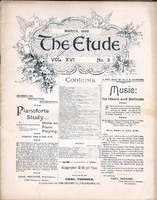Selected Content from the March 1898 Edition of The Etude
GREAT interest has been manifested, in the few large cities in which Franz Rummel has appeared, in the playing of this “veritable giant,” as one of the New York papers calls him. The historical recitals which he gave, on a previous visit to this country, made a profound impression upon the musical public. A demand is made that he duplicate that series. Read More
I do not believe that in art, whatever may be true in the purely utilitarian pursuits, “a little knowledge is a dangerous thing.” Whatever ministers to the sum total of human happiness is a good thing, and I wouldn’t dissuade the ignorant darky lad from playing the bones if it made him happy—and he was out of my hearing! Read More
The use of a bowl of water in a room where there is a piano is to create sufficient moisture to counteract the dry heat produced by the stove. But to do this the water must be evaporated by heat, therefore, the water is useless unless placed on the stove; on no account place it on the piano. Rubbing the strings moderately with a chamois skin is the best and safest way of removing rust. Carbolic acid should never be used. Read More
DR. ROBERT GOLDBECK, AT 4104 DREXEL Boulevard, Chicago, desires to say to the readers of The Etude that he will be glad to help them in their musical studies, if they will write to him. Read More
Amateurs, unless born with these same dramatic instincts, seldom make a clear-cut pause—they end a phrase after the time and begin ahead of the beat; their rests are consequently slovenly and without meaning. The pause, in all rhetorical utterance, from the early Greek and Roman days, has been treated not only as a punctuation, but also as an instrument to conviction. The orator knows the power of his periods, commas, and semicolons. Why should not the pianist likewise reveal the strong significance of his whole-rest, half-rest, quarter-rest, and so on, through the whole gamut of musical rhetoric? Read More
Should artists marry? is a question that has often been propounded. Some people question if a man of the true musicianly type can be a good husband. His art must ever be dearer and closer to him than any wife, they argue; his thoughts, his real being, will be so much absorbed by the Muse that he will be careless, even neglectful, of the one who bears his name. Read More
From time to time there have appeared in The Etude accounts of musical societies and clubs composed of amateur musicians, but none which seem to have worked along the same line as the one with which I have the honor… Read More
“There is something fascinating about the music life!” said a student one day. “A man or woman who takes up that work must have many happy hours in the course of a life-time. I have so many even in my modest part of a dilettante.” The cynical musician smiles, but grimly, when he hears such outbursts from pupils. Read More




